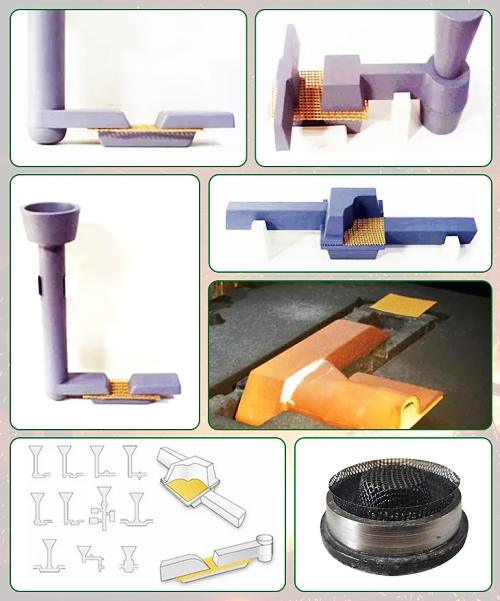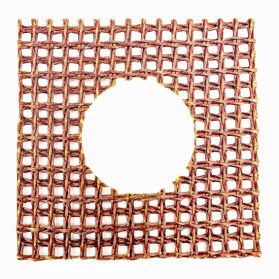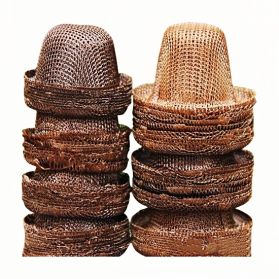In industrial settings, maintaining optimal air quality is not only essential for the health and safety of workers but also for the efficiency of operations and the lifespan of equipment. One solution that has gained prominence in recent years is the use of fiberglass cone filters. These filters offer a unique combination of effective filtration and energy efficiency, making them a popular choice for various industries.
By effectively capturing contaminants, improving air quality, and contributing to energy efficiency, these filters play a vital role in enhancing the overall productivity and safety of industrial operations. Whether in manufacturing, automotive, food processing, or chemical industries, the adoption of fiberglass cone filters is a step towards a healthier, more efficient, and environmentally conscious approach to industrial air management.
Parameter
Fiberglass cone filters find extensive application in the industrial sector due to their ability to efficiently remove a wide range of airborne contaminants. These filters are designed to capture particles such as dust, fumes, pollutants, and allergens, thereby creating a cleaner and safer air environment within industrial facilities.
Fiberglass Filter Mesh Sheets are made of high temperature resistant fiber, woven and processed by special technology. Widely used in automobile and motorcycle wheels, cylinder pistons, aluminum rods, aluminum materials, aluminum ingots, aluminum plates and precision casting of all types of aluminum alloy casting.
| Type | Alkali-free Fiberglass filtration mesh for aluminum |
| Work Temperature | 700-800℃ |
| Softening Temperature | 900℃ |
| Continuous Working Hours | <20Min.(700-800℃) |
| Gas Emit | ≤30cm 3/g |
| Thickness | 0.5mm |
| Weight | 150-350 g/m2 |
| Hole Size | 0.8*0.8/1.0*1.0/1.2*1.2/1.5*1.5/2.0*2.0/2.5*2.5mm |
| Weave Pattern | Leno |
| Certificate | ISO9001:2015 |
◆In industrial settings, airborne contaminants can arise from various sources, including manufacturing processes, machinery, and materials. Fiberglass cone filters excel in capturing both large and small particles, ensuring that these contaminants are effectively removed from the air. This not only improves air quality but also prevents the accumulation of particles on equipment and surfaces.
◆Industrial facilities often rely heavily on HVAC systems to maintain appropriate temperature and air circulation. Fiberglass cone filters offer a balanced approach to filtration, effectively capturing pollutants without causing excessive airflow resistance. As a result, HVAC systems can operate more efficiently, leading to energy savings and reduced operational costs.
◆Airborne particles can have a detrimental effect on machinery and equipment. By using fiberglass cone filters, industrial facilities can prevent particles from entering sensitive machinery components, leading to reduced wear and tear. This, in turn, extends the lifespan of equipment, minimizing the need for frequent replacements and repairs.
◆Worker health and safety are paramount in any industrial setting. Fiberglass cone filters contribute to a healthier work environment by reducing the concentration of airborne pollutants that could otherwise lead to respiratory issues and other health concerns among employees.
◆Manufacturing Facilities:In manufacturing plants, various processes generate airborne particles that can compromise air quality. Fiberglass cone filters are used to capture these particles, ensuring that the air remains clean and conducive to efficient production.
◆Automotive Workshops:Automotive workshops deal with fumes, dust, and debris on a daily basis. Fiberglass cone filters are employed to effectively capture these pollutants, providing a safer and more comfortable workspace for mechanics and technicians.
◆Food Processing Units:Maintaining hygiene and air quality is crucial in food processing. Fiberglass cone filters help remove contaminants from the air, ensuring that the final products meet stringent quality and safety standards.
◆Chemical and Pharmaceutical Facilities:In environments where chemicals are handled, maintaining clean air is vital to prevent cross-contamination and ensure the safety of workers. Fiberglass cone filters play a key role in removing harmful particles and fumes from the air.
The installation of fiberglass cone filters in industrial settings follows a similar process to residential installation. However, due to the larger scale of industrial systems, it's recommended to involve HVAC professionals to ensure correct installation and optimal performance.
①Use area of filter net: F1 = F2 / AxB
● F1: the cross-sectional area of the casting system.
● F2: the original cross-sectional area of the casting system.
● A: the porosity of the filter screen, generally 50-60%.
● B: the filtration rate of filter screen, generally 60-80%.
Therefore, the cross-sectional area of the casting system is generally 2-4 times that of the casting system without the casting net.
② Position of filter screen:
● Place the filter under the sprue cup;
● Placed on the parting surface under the sprue;
● Three different positions on the lap surface of the runner.

Regular maintenance is essential to maximize the effectiveness of fiberglass cone filters in industrial applications. This includes routine inspections, cleaning or replacement of filters, and adherence to maintenance schedules.
Q: Can fiberglass cone filters handle industrial-level pollutants?
A: Yes, fiberglass cone filters are designed to capture a wide range of pollutants, making them suitable for industrial settings.
Q: How often should fiberglass cone filters in industrial settings be replaced?
A: Replacement intervals depend on factors like the type of pollutants and the volume of air being filtered. Regular inspections will help determine when replacements are needed.
Q: Can fiberglass cone filters improve equipment performance?
A: Absolutely. By preventing particles from entering machinery components, these filters contribute to better equipment performance and longevity.
Q: Do these filters comply with industrial safety standards?
A: Fiberglass cone filters manufactured by Cangchen often meet or exceed industry safety and efficiency standards.
Q: Can fiberglass cone filters be customized for specific industrial needs?
A: Yes, Cangchen offers customization options to ensure that filters are tailored to the specific requirements of different industries.
Application:
Green sand casting aluminium filtration
Modified DISAmatic casting
Core package casting
Gravitydie casting
Low pressure die casting
High pressure die casting
Vacuum die casting
Squeeze casting
Thixocasting
Vacuum riserless casting
Lost foam casting



High Silica Fiberglass Fabric Filter Mesh For Steel Iron And Copper (Thick Type)
High Silica Fiberglass Fabric Filter Mesh For Steel Iron And Copper (Thick Type)

Fiberglass Cap Filter For Aluminium Pistons Filtration

Smokeless Odorless Fiberglass Casting Filter Mesh For Aluminum
Smokeless Odorless and Flameless Fiberglass Casting Filter Mesh For Aluminum liquid Filtration.

Look forward to hearing from you:
Contact Us
+86 158 3011 4065
Guoruiyuan Building, ShengLi North Street, Chang'An District, Shijiazhuang City, Hebei Province, China.
Navigation
Navigation
